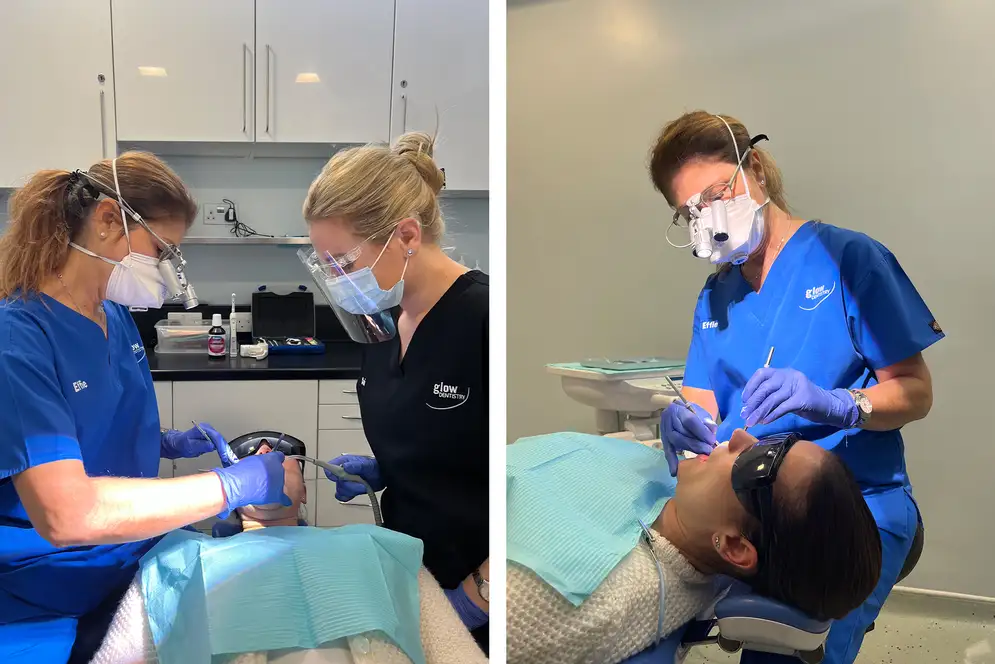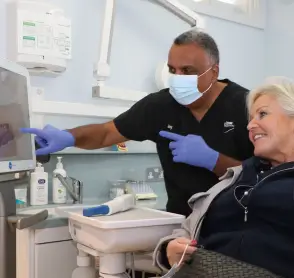




Gum disease typically presents as an occasional soreness and redness of the gums that develops into swelling and inflammation. Left untreated it can lead to tooth loss.

Hi, I’m Dr Effie Tsitoura. I’m a dentist who specialises in the prevention, diagnosis and treatment of diseases that affect the gums and jawbone. I’m a passionate specialist and my focus is transforming my patients’ wellbeing by stabilising their teeth, eliminating bleeding or sore gums, and increasing self confidence. My treatments are bespoke, meticulously planned and highly specialised.
I will choose the appropriate treatment to bring the infection under control and help you to understand the causes of the gum problems to help prevent reoccurrence.
Periodontal (gum) disease is a bacterial infection of the tissues that support the teeth and hold them in place. The primary cause of periodontal disease is bacteria that accumulate on the tooth surface and form a sticky, colourless film called “bacterial plaque”. Toxins produced by bacteria in plaque irritate the gums, which become red, tender and swollen, and they are then more likely to bleed because they are inflamed. This condition is called gingivitis.
In patients susceptible to periodontal disease, if gingivitis remains untreated, it propagates to the underlying tissues. The produced toxins and enzymes destroy the supporting bone. Gums detach from the tooth surface and pockets are formed that can fill with plaque populated by more destructive anaerobic bacteria. This condition is called periodontitis and unless treated, the affected teeth are likely to become loose and can eventually be lost prematurely.
Periodontitis is the most common chronic inflammatory disease in humans.
If bacterial plaque is not removed from the tooth surface by thorough brushing, it calcifies and becomes a hard, rough and porous deposit called “calculus” or “tartar”. The presence of calculus on the tooth surface encourages the growth of bacterial plaque.
The primary cause of periodontal disease is the presence of virulent (very harmful) bacteria that usually develop in anaerobic conditions, combined with the individual’s susceptibility to periodontal disease.
Periodontal Disease and Diabetes
Patients with diabetes Type I and Type II are three times more likely to develop periodontal disease, while patients with periodontitis are at a higher risk of diabetes. It is more complicated to control diabetes when the patient is also suffering from periodontitis, while patients with both diseases are at a higher risk of severe medical complications.
Periodontal Disease and Cardiovascular Disease
There is scientific evidence to support a relationship between periodontal disease and increased risk of episodes of cardiovascular disease.
Periodontitis and Pregnancy
The presence of periodontitis in a pregnant woman may increase the risk of premature birth and of giving birth to an underweight child.
Gum disease is not a problem that will go away and, if left untreated, there can be severe consequences.
Periodontal disease is a major cause of premature tooth loss, - which can have functional, psychological and financial implications.
Untreated gum problems can affect your general health. Scientific evidence suggests a relationship between periodontal disease and diabetes and increased risk of cardiovascular disease.
There are a number of treatments available for periodontal (gum) disease. Our periodontal specialist, Dr Effie Tsitoura will discuss the available options for treatment with you and help you choose the best course of action. Here are some brief descriptions of the more common treatments. If you have any questions, Dr Tsitoura will be able to answer them.
The initial aim of periodontal treatment is to arrest the progression of the disease by controlling the infection under the gums. This can be achieved by thorough non-surgical debridement, which involves thorough removal of bacterial plaque and calculus (tartar), above and under your gums.
An integral part of periodontal treatment is teaching you how to brush your teeth effectively. An excellent level of oral hygiene is essential to achieve favourable treatment outcomes.
In more complex cases, surgical interventions allow us to correct the anatomical consequences of the disease. There are two main types of surgical intervention:
The main objectives of this type of periodontal surgery is to eliminate residual subgingival infection, to further decrease the pocket depth and to establish favourable soft tissue anatomy that will help with self-performed oral hygiene.
This aims at the true regeneration of the supporting periodontal tissues that were lost due to periodontal disease. The periodontist will decide whether biomaterials, host modulators or a combination of the two should be used. These products will help regenerate lost tissues.
This aims at supporting the patient’s ongoing efforts to maintain treatment outcomes and ensure long-term periodontal (gum) health. This can be achieved if patients follow our tailor-made maintenance programme for professional cleaning.
A procedure used:
This is a surgical procedure used to correct single or multiple gingival (gum) recessions, which have been created as a result of improper brushing techniques (usually overbrushing) in patients with otherwise healthy gum structure. Depending on local factors, a soft tissue graft harvested from the palate may also be used.
This is a surgical procedure utilised for the removal of an attachment called the frenulum that decreases the range of motion of the lips or of the tongue. In some patients, a labial frenectomy can close the gap between the front teeth.

Sign up to our Premier Plan to receive huge discounts on regular appointments. For just £18.75 a month, get two annual Healthy Mouth Assessments, two hygiene appointments and a host of other benefits – including discounts on treatments.




Our flagship dental clinic was established in 2002, providing general and specialist dental treatments.
0207 433 3252 info@glowdentistry.co.ukIn 2011, we opened our Mill Hill clinic where we are able to offer our patients restorative and cosmetic dentistry.
0208 906 7676 millhill@glowdentistry.co.uk